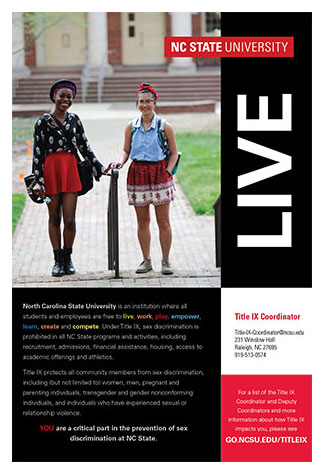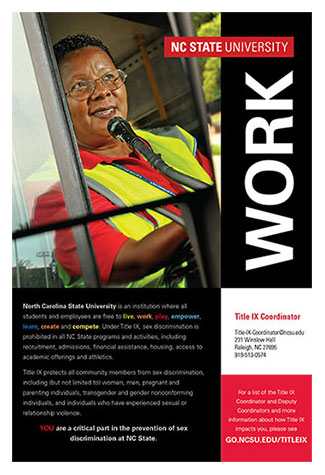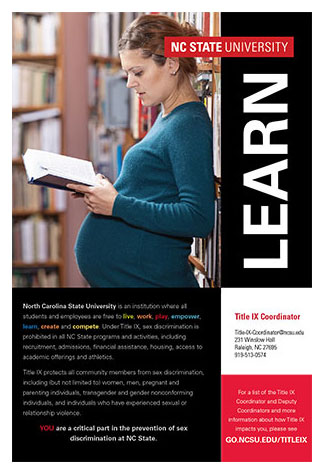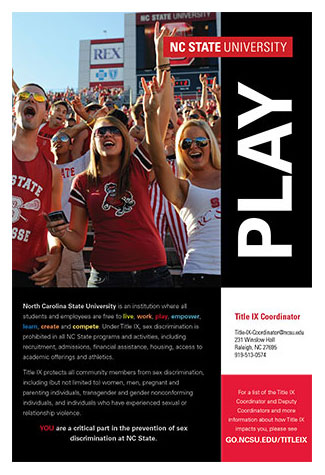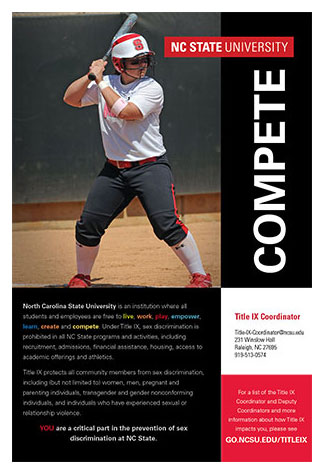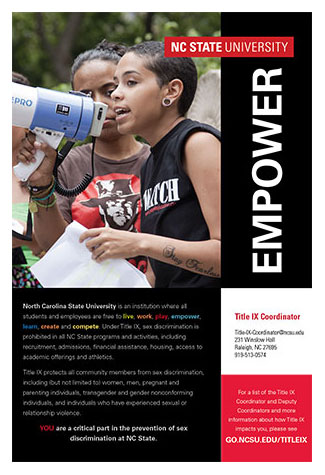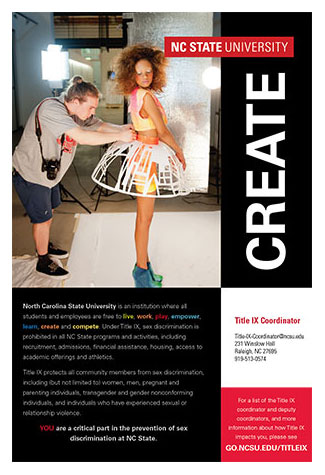Title IX Resources
We provide the following resources pertaining to Title IX.
Terms and Definitions
NC State uses the following definitions related to Title IX and interpersonal violence:
consent — an affirmative decision to engage in an activity given by clear action or words. It is an informed decision made freely, willingly, and actively by all parties. Behavior will be considered “without consent” if no clear consent, verbal or nonverbal, is given. Consent cannot be procured by physical force, threats, intimidating behavior, or coercion. A person cannot give consent if the person is Incapacitated as a result of alcohol or drug consumption (voluntary or otherwise), is unconscious, unaware or asleep during the act, is under the legal age to provide consent, or otherwise lacks the capacity to consent. In determining whether a person is Incapacitated, the analysis must include whether the Respondent knew or should reasonably have known that the person was Incapacitated. A lack of protest or resistance is not a valid form of consent. Silence is not a valid form of consent. A prior relationship or prior sexual activity is not sufficient to demonstrate consent for sexual activity. Consent can be revoked or withdrawn at any time, even during a sexual act. If consent is withdrawn, the act is no longer consensual. (As defined in NC State REG 11.35.02 Student Discipline Procedures Section 2.6.)
dating violence — Dating violence means violence committed by a person- (i) who is or has been in a social relationship of a romantic or intimate nature with the victim; and (ii) where the existence of such a relationship shall be determined based on the consideration of the following factors: (a) The length of the relationship; (b) The type of relationship; (c)The frequency of interaction between the persons involved in the relationship. (As defined in NC State POL 04.25.07 Title IX Sexual Harassment Policy.)
domestic violence — Domestic violence includes felony or misdemeanor crimes of violence committed by a current or former spouse or intimate partner of the victim, by a person with whom the victim shares a child in common, by a person who is cohabitating with or has cohabitation with the victim as a spouse or intimate partner, by a person similarly situation to a spouse of the victim under the domestic or family violence laws of the jurisdiction, or by any other person against an adult or youth victim who is protected from that person’s acts under the domestic or family laws of the jurisdiction. (As defined in NC State POL 04.25.07 Title IX Sexual Harassment Policy.)
incapacitated — a state beyond intoxication where a person cannot make rational, reasonable decisions because the person lacks the capacity to give knowing consent and to understand the who, what, when, where, why or how of a particular activity. (As defined in NC State REG 11.35.02 Student Discipline Procedures Section 2.12.)
interpersonal violence — (1) In a current or former dating, romantic or intimate relationship, engaging in physical, sexual, emotional, economic, or psychological actions or threats of actions that a reasonable person in similar circumstances would find abusive, intimidating, or threatening; or (2) Engaging in a course of conduct directed at a specific person, whether in the context of a social or intimate relationship or otherwise, that would cause a reasonable person to feel fear for their safety or safety of others or suffer substantial emotional distress. This may include, for example, non-consensual communication, including in-person or cyber communication or contact, surveillance, telephone calls, voice messages, text messages, email messages, social networking site postings, instant messages, postings of pictures or information on websites, written letters, gifts or any other communications that are unwelcome and/or place another person in fear of, or at risk of, physical injury or danger.
sexual contact without consent — the intentional touching of another person’s intimate parts (including mouth, genitalia, groin, breast or buttocks or clothing covering any of those areas); or the deliberate touching of another person with one’s intimate parts; or using force to cause a person to touch their own or another person’s intimate parts. (As defined in NC State POL 11.35.01, Code of Student Conduct Section 10.15.)
sexual exploitation — taking sexual advantage of another person without Consent, and includes, but is not limited to, causing or attempting to cause the incapacitation of another person in order to gain a sexual advantage over the other person; causing the prostitution of another person; recording, photographing or transmitting identifiable images of private sexual activity and/or the intimate parts (including genitalia, groin, breasts or buttocks) of another person; voyeurism and indecent exposure, and other sexual offenses, and allowing third parties to observe private sexual acts. (As defined in NC State POL 11.35.01, Code of Student Conduct Section 10.15.)
sexual harassment — a form of Harassment which is based on a person’s sex or is of a sexual nature. Sexual Harassment can include unwelcome sexual advances, requests for sexual favors, sexual exploitation, and other verbal, non-verbal or physical harassment of a sexual nature. Allegations of sexual harassment as defined under Title IX may be addressed by the Title IX Sexual Harassment Policy (NCSU POL 04.25.07).
sexual penetration without consent — the penetration (anal, oral, or vaginal) of another person, however slight, by a penis, tongue, finger, or an inanimate object; or mouth to genital contact or genital to mouth contact; or where a person is forced, caused, or made to sexually penetrate themself or another person. (As defined in NC State POL 11.35.01, Code of Student Conduct Section 10.15.)
stalking — engaging in a course of conduct directed at a specific person that would cause a reasonable person to- (i) fear for their own safety or the safety of others; or (ii) suffer substantial emotional distress. (As defined in NC State POL 04.25.07 Title IX Sexual Harassment Policy.)
Title IX sexual harassment — conduct on the basis of sex that satisfies one or more of the following: a university employee conditioning the provision of an aid, benefit, or service on another employee’s or student’s participation in unwelcome sexual conduct (“quid pro quo” harassment by an employee); unwelcome conduct determined by a reasonable person to be so severe, pervasive, and objectively offensive that it effectively denies a person equal access to an Education Program or Activity at NC State; or sexual assault as defined in the Jeanne Clery Disclosure of Campus Security Policy and Campus Crime Statistics Act (“Clery Act,” specifically 20 U.S.C. 1092(f)(6)(A)(v)), dating violence as defined in Violence Against Women Act (“VAWA,” specifically 34 U.S.C. 12291(a)(10)), domestic violence as defined in VAWA (34 U.S.C. 12291(a)(8)), stalking as defined in VAWA (34 U.S.C. 12291(a)(30)), or other sexual misconduct defined . (As defined in NC State POL 04.25.07 Title IX Sexual Harassment Policy.)
See also:
- Jeanne Clery Disclosure of Campus Security Policy and Campus Crime Statistics Act (Clery Act)
- North Carolina Statutes – Definition of Domestic Violence
- North Carolina Statutes – Definition of Sexual Assault
- NC State University Polices, Regulations and Rules
Posters
Title IX enables all members of our community to live, work, play compete, empower, create and learn regardless of gender or sex. NC State recognizes that sex and gender identity are important parts of the academic, working and living environment everywhere our campus reaches.
To help ensure awareness and compliance with Title IX, every campus building should display at least one Title IX poster in English and preferably also one in Spanish.
How to Get Involved
The following organizations offer opportunities in the areas of professional and academic development:
Council on the Status of Women – The NC State Council on the Status of Women is charged with advising the provost on matters related to the professional development and support of all NC State women on and off campus, including faculty, staff and students.
Women in Science and Engineering (WISE) – The WISE Village provides first and second year women entering into the STEM fields a unique opportunity to live and work with other women in STEM majors taking similar classes and with similar interests.
NC State Women’s Center and The Movement – The Movement is a group of paid, trained peer educators who facilitate workshops. The Movement is a program of the NC State Women’s Center.
